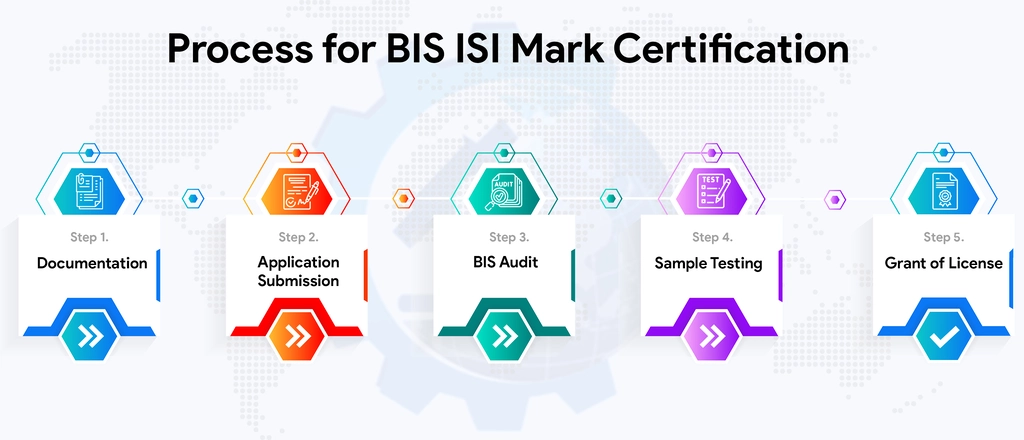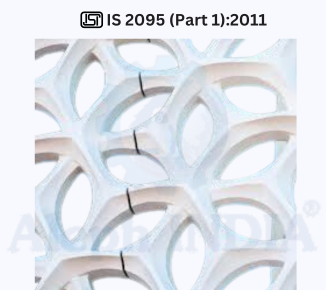BIS CERTIFICATION for Gypsum Plaster Boards – Specification: Part 1 Plain Gypsum Plaster Boards IS 2095 (Part 1)
Published Date: November 9, 2024 4 min Read
Introduction
IS 2095 (Part 1):2011 for plain gypsum plaster boards is an Indian standard code used in the construction industry for plasterboards of plain gypsum under BIS Certification. Gypsum is a naturally occurring mineral; therefore, it is light and easy to handle. Its use involves residential and commercial buildings in the walls and the ceilings. Boards like these can be used to create smooth walls, false ceilings, and partitions based on their utility. Gypsum plaster boards have become popular because they provide fire resistance and good sound insulation, making them suitable for meeting current construction requirements.
The demand for efficient building materials increases the market for gypsum plaster boards. To obtain quality and safety standards, products must take BIS certification, which ensures that these products meet necessary criteria related to strength and performance.
OVERVIEW
IS 2095, Part 1: 2011 specifies requirements for gypsum plasterboards used in buildings and covers thickness, toughness, and testing. This product is used to cover standard gypsum plasterboard on walls or ceilings, which can be painted or applied with plaster. It allows manufacturers to produce products that can be trusted and promotes the use of natural gypsum through construction.
Key highlights
| Product Name | Gypsum Plaster Boards – Specification: Part 1 Plain Gypsum Plaster Boards |
| Applicable Indian Standard | IS 2095 (Part 1):2011 |
| Applicable Certification Scheme | Product Certification Scheme (ISI Mark Scheme) Scheme 1 |
| Applicable Mark: | BIS Standard Mark (ISI Logo) |
| Compliance Requirement | Mandatory |
| Quality Control Order | Click here |
| Ministry | MINISTRY OF COMMERCE AND INDUSTRY |
| Scope as per Standard | This standard (Part 1) lays down the requirements for plain gypsum plaster board intended to be used for drywall (partition), ceiling and wall lining, and panelling in buildings. It includes boards manufactured to receive either direct surface decoration or gypsum plaster finishes. |
| Major Country of Import | Various, including countries with established gypsum manufacturing industries (e.g., UAE, Oman, and China). |
Applicable Tests
Mandatory Tests:
- Dimensions
- Finish
- Density
- Flexural Breaking Load
Optional Tests:
- Material
- Fire Resistance

Note
For Detailed Information about the Procedure for BIS ISI Certification, Visit :
Timeline for BIS Certification
The approximate timeline to obtain BIS certification for Gypsum Plaster Boards – Specification: Part 1 Plain Gypsum Plaster Boards IS 2095 (Part 1):2011 is as follows:
- For Indian Manufacturers (Standard Timeframe – 30 days)
- For Foreign Manufacturers (Standard Timeframe – 180 days)
Benefits of BIS Certification
BIS certification boosts product credibility, enhances consumer trust, expands market access, and gives manufacturers a competitive edge.
| Benefit | Description |
|---|---|
| Access to the Indian Market | BIS certification is essential for numerous products, facilitating smooth entry and trade in India. |
| Compliance with Indian Standards | It ensures conformity with national safety and quality standards, promoting consistency and reliability. |
| Enhanced Product Credibility | Certification indicates quality assurance, helping products distinguish themselves in a crowded market. |
| Increased Customer Trust | Consumers prefer certified products, assured they meet stringent safety and performance criteria. |
| Benefits for MSMEs | BIS certification gives small and medium enterprises a competitive advantage and access to government tenders. |
Conclusion
BIS certification is a strategic asset for quality assurance and market growth in India. ALEPH INDIA aids manufacturers in achieving this vital certification.
Aleph INDIA has been serving the industry as a single-window operator for all product regulatory compliance. We can assist importers or manufacturers in meeting all criteria for importing or selling a product in the Indian market.
Frequently Asked Questions
International Audits & Participation
Testimonials
BIS REGISTRATION FOR ELECTRONIC & IT PRODUCT
In the era of globalization, world trade is growing rapidly and henceforth, Manufacturing and Import/Export businesses are also growing drastically...View More
BIS CERTIFICATE FOR FOREIGN MANUFACTURER
The Economy of India-the fastest developing economy on the globe with the capabilities that help it matches up with the biggest international...View More
PRODUCT CERTIFICATION SCHEME (ISI MARK) FOR DOMESTIC MANUFACTURERS
Anything a person buys from food to cars, clothes to electronics, branded to unnamed products there is always a question that wanders in one’s...View More
WIRELESS PLANNING AND COORDINATION (WPC)
WPC: Wireless means communication done from one point to another point without the wires and cables. Electromagnetic waves carry the ...View More
BUREAU OF ENERGY EFFICIENCY (BEE) CERTIFICATE
BEE CERTIFICATE: Energy is the future, and its conservation is the way of the bright future. Everyone claims the environment is important...View More
E-WASTE MANAGEMENT
E-waste is one of the world's fastest-growing trash streams. We currently manufacture almost 50 million tones of it each year...View More
View All Services
Request a call back.
Would you like to speak to one of our Senior Technical advisers over the phone? Just submit your details and we’ll be in touch shortly. You can also email us if you would prefer.






























